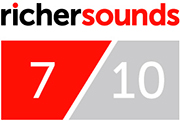
Once a major component of 80s indie powerhouse The Smiths, Johnny Marr returns for his third solo studio album. Has he finally shrugged off the bonds of his past, or will his success forever haunt him?
The short answer: no, and yes. Few bands have ever, or will ever reach the stratospheric heights that The Smiths have, and to use the band as point of reference is infuriating. Marr is not trying to emulate, not trying to return to the past. Call the Comet is a nicely paced album of versatile tracks that quite firmly establish him as his own man. It takes all the virtues of the music made by Marr’s past contemporaries, Ian Brown/Stone Roses, Primal Scream et al, and sprinkles it with a modern flair. With his current sound, it’s easy to see how Marr has probably influenced, and has maybe been influenced by the young artists pioneering the resurrection of this kind of guitar music; Miles Kane being one such example. An enjoyable trip through old and new, Call the Comet is a confident approach to a well-travelled path that does enough to keep the veteran feeling fresh.
As things get moving, “The Tracers” becomes an early stand out track. Throughout the four and half minute run time, a relentless drum line lays out a solid base for the track, driving it ever forward. Distorted guitar and bass deliver a nicely lo-fi vibe whilst Marr’s spoken word sections drift somewhat dreamily over the top. The occasional falsetto-vocal ornaments break the track up nicely, too. Lyrically psychedelic in tone ‘Catch the clouds pour down from the sky / Come to me, evaporate‘, “The Tracers” is both ephemeral and ominous; beautiful poetics suggesting loss of love, sacrifice of virtue. It feels a little veiled, the dreamy verse hard to pin down. But loss is certainly the focal point of the track, giving it a melancholy feel, nicely complimented by the fuzzy, heavy instrumentation.
As the album ambles its way along, Marr deploys a blinding track in “New Dimensions”. Even a cursory analysis indicates Marr’s lyrics are simultaneously evocative of a common rock trope (‘live fast die young… it’s better to burn out then fade away‘) and a rejection of the state of things around him. The words are considered and explicit; no hiding behind complex subtext here. The composition is simple but full of swagger; the electronic drums and gritty riffs melt wonderfully together with the distorted, tight bass line. The entire track feels like a well-orchestrated crescendo that peaks with a solo-come-bridge; a slow, burning guitar line full of attitude. And then the track stops exactly at the right time. Refusing to outstay it’s welcome, it treats the listener to a tightly constructed number that is arguably one of the best on the album.
The album remains dynamically uniform by and large, dynamically consistent as it soldiers on through the track listing. However, the album’s finale, “A Different Gun”, attempts to rein it in a little, by softening the edges and polishing up the previously ragged drum and guitar parts. The production is little cleaner and Marr’s vocal lines are slightly more prominent in this more refined offering. Effect-heavy guitar is the hero of this piece, riffs and licks flowing in and out of the soundscape like liquid, repetitive and trance like in their nature. It’s a pleasing track that offers a little diversity in the wake of a rather singularly minded album. However, it could offer just a tad more emotion, a little more oomph. The track is a nice way to draw the album to a close, but sadly doesn’t leave a lasting impression.
 As a more general observation, whilst his instrumentation and composition are always accomplished, Marr is oft critiqued for the depth and quality of his voice. And there is something to be said for the fact that if some of these tracks had a more virtuoso vocalist at the helm they would truly sparkle. However, they don’t, and that’s fine. Musical heritage considered, Marr is always going to struggle to match his spiritual brother’s idiosyncratic cadences. But that shouldn’t matter. If Marr wanted to echo the stylings of The Smiths he would be on his knees begging Morrissey for a reunion. He isn’t. He’s creating music that, whilst occasionally drawing on his roots, draws a clear line between past and present. His vocals carry the tracks well enough, a confident performance that allows the listener to focus mainly on the music. It’s straight down the middle, good rock and roll.
As a more general observation, whilst his instrumentation and composition are always accomplished, Marr is oft critiqued for the depth and quality of his voice. And there is something to be said for the fact that if some of these tracks had a more virtuoso vocalist at the helm they would truly sparkle. However, they don’t, and that’s fine. Musical heritage considered, Marr is always going to struggle to match his spiritual brother’s idiosyncratic cadences. But that shouldn’t matter. If Marr wanted to echo the stylings of The Smiths he would be on his knees begging Morrissey for a reunion. He isn’t. He’s creating music that, whilst occasionally drawing on his roots, draws a clear line between past and present. His vocals carry the tracks well enough, a confident performance that allows the listener to focus mainly on the music. It’s straight down the middle, good rock and roll.
Call the Comet is an album that knows what it wants to deliver. The riffs are strong, the soundscape chunky and strutting, a welcome homage to the guitar in an increasingly computer based industry. Marr doesn’t refuse to accept that times have moved on, he carefully balances the occasional synth against his blend of more traditional instrumentation, establishing a comfortable and pleasing equilibrium. Lyrically evocative of the desire for apocalypse in the face of a slowly more turbulent world, Marr distils just the right amount of cultural commentary in to an album that keeps the music firmly in the driving seat.
Certainly worth consideration, give this album a listen at your local Richer Sounds on a hi-fi system worthy of its mettle!

Author: Lewis, Chester store





